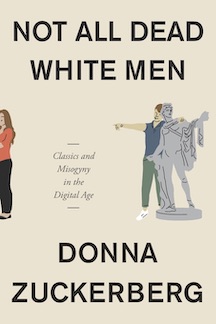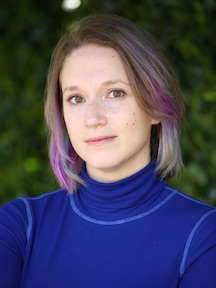By Giannina Ong
Graduate Phi Beta Kappa. Obtain a graduate degree from Princeton. Co-found a nonprofit. Begin an online journal. Write and publish a book. Get trolled and cyberbullied. Not the traditional trajectory for any PhD-wielding scholar, much less a classicist, but all this is just a decade in the life of Donna Zuckerberg.
The background in classics that set her on this path almost was an English degree. Zuckerberg’s rationale of why she declared classics is an oft-repeated trope. As in other institutions of higher education, undergrads at University of Chicago are required to take a full year of a foreign language. Having taken Latin in high school, Zuckerberg—then still an English major—decided to continue studying the ancient language to fulfill said requirement. In doing so, she opened Pandora’s box, a folly that often transforms students into classics majors (myself included).
“I was in section one week, talking with my TA about a complicated sentence construction, and he said, ‘Where are you in Greek?’ and I said, ‘I don’t take Greek,’ and he said, ‘Oh, you don’t take Greek yet.’ He was right; I started Greek that summer,” Zuckerberg recalls.
In that way, Zuckerberg is the common archetype of a classics major. In all other ways, she strays from the typical paths of academic scholars, especially as a female classicist. At the age of 20, she entered the PhD program at Princeton. As a graduate student, she co-founded The Paideia Institute, a nonprofit that promotes the study of classics, supporting interested individuals of all ages and academic levels. While finishing her dissertation, she moved across the country to the San Francisco Bay Area and had her first child.
Zuckerberg is not a tenured professor, but that was not always the plan: “I completely thought that was where I was heading. I definitely thought I was going to be a tenured or tenure-track professor, but life gets in the way sometimes of our best laid plans.”
After completing her dissertation, Zuckerberg found herself nicely settled in Silicon Valley and unwilling to have the geographic flexibility that most academic posts demand. Her partner was happily employed at a tech startup and the two were building a family. Moreover, it was a moment when the Zuckerberg’s, a tight-knit family—consisting of Zuckerberg’s own budding family, her parents, and her three siblings—found themselves all on the same coast. (In a like-mother-like-daughter fashion, Zuckerberg noted that being recognized by Phi Beta Kappa is special because her mother is also a Phi Bete and a proud one, too, pointing out that “she has a key and everything.”) Zuckerberg did not want to lose that. That’s how despite living in one of the most economically prosperous regions in the world, Zuckerberg in 2015 was unsure of her next steps.
It was in the depths of being what she called “academically dead” that Zuckerberg began Eidolon: “It’s when you get shut out of JSTOR and you don’t have an academic affiliation anymore. It is terrifying. You can’t access or look up anything. I thought I was just not going to do classics anymore. I was taking care of my baby, and then I started having these ideas for short articles about intersections of classics and modern life. I was like ‘You know what, I’ll blog about them.’ When I was writing, I realized there is no apparatus to do this. I figured there might be others like me and that there should be a platform for people who want to write and publish these types of public facing essays.”
Initiated as an online journal sponsored by The Paideia Institute, Eidolon was named so in part by Jason Pedicone, another co-founder and then-president of The Paideia Institute. “Eidolon” in ancient Greek is roughly translated as a ghost-image or apparition. Zuckerberg’s Eidolon, too, lives in the liminal space between academic journal writing and op-eds, linking modern-day interests to classics by producing essays, satires, and musings with a scholarly bent towards antiquity.
Eidolon parted ways with The Paideia Institute in 2014, and despite Zuckerberg’s anticipation of failure, the digital publication is thriving, having just passed over 1.5 million views. “I thought it would probably peter out in a few months,” she said. “I thought no one would read the things we published, no one would pitch to me, and it would just sort of be a failure.”
The success is due in part to the accessibility of the online journal. Not only is Eidolon not obstructed by paywalls, Zuckerberg as an editor constantly encourages her writers to adopt a voice and tone that contextualizes the antiquity in focus and the arguments made so that a general audience can approach and add to the conversation. In addition, Eidolon seeks to make classics “political and personal, feminist and fun” and takes submissions from a slew of writers including high schoolers as well as tenured professors.
The journal’s most read article, “How to Be a Good Classicist Under a Bad Emperor,” written by Zuckerberg herself, serves as a preface to the publication of her monograph. In the article, she discusses the appropriation of classical texts by the alt-right and misreadings that propagate racial purity through the cultural weight of the societies that built “Western civilization.” Published last year, Not All Dead White Men (Harvard University Press) dives deeper into digital realms zeroing in on the red-pill community’s interest in Stoicism, pickup artists’ use of Ovid’s Ars Amatoria—typically read as satirical by scholars due to its backwards advice regarding the courtship of women—as a didactic text, and men’s rights activists claiming there is a rising prevalence of false rape accusations juxtaposed with the power relations displayed in Euripides’ Hippolytus—a Greek tragedy in which this injustice actually occurs.

Zuckerberg’s criticism of those online communities did come back to bite. Simply Googling her name leads to blog posts listed in the first page of search results that name call and belittle her and her work. On the cyberbullying, she remarked: “I did not actually realize how bad it would be. I thought I would be able to bear up under it. It has not always been easy, but I have been able to do that. I am in a very privileged position, and I am cognizant of that. I think that people who are in privileged positions should take bigger risks, and that is what it means to be a good ally.”
However, the criticism does not only come from her research subjects, but also colleagues in her discipline. She is often confronted with the idea that these cyberbullies are probably just bored men living in their mother’s basements and that classicists should not waste their time on these communities.
“It seems clear at this point that we are not talking about a few trolls. I remember someone said that to Helen Morales in front of me. She got very upset, and she said tell that to the dead students on my campus after Elliot Rodger’s killing spree. This is the real world that we live in. The internet is not to be thought of as separate from real life anymore,” Zuckerberg said.
Aptly, Eidolon’s mission statement “Classics without fragility” is both an ode to Robin DiAngelo’s concept of white fragility and a nod to the fragmented and fragile physical nature of the primary texts that classicists work with. DiAngelo premises that there is an impulse to jump to defensiveness rather than accept any criticism that condemns. Likewise Zuckerberg is not afraid to take on classical scholars who defensively neglect the modern-day implications of their work.
“It is funny because ‘Classics should have no connection to today’s politics’ is a kind of politics in itself. That is a political stance. It is a very specific kind of politic. In the same way, when you think we should stop thinking about identity politics that often just means we should pretend to think of everybody in the way we think about white men. It is a way of dodging the issue,” she said. “In my discipline, it is also a misunderstanding of what a politically contextualized classics looks like. Because nobody is saying, ‘Don’t read Cicero.’ I am definitely not saying that. There seems to be this idea that just reading the texts is getting replaced with looking at classics through an identity politics lens, which in my experience is not the case at all. Every classicist who is doing more activist classicist work is also just teaching the text. We are all interested in that.”
Unwilling to dabble in modern-day politics, gatekeepers of academia’s ivory tower too often defensively protect the canon unable to let go or even address inherently problematic texts. One only has to recall the Columbia University student’s complaint of the triggering nature of reading Ovid’s Metamorphosis that spurred a national conversation in 2015 on trigger warnings with the older generations calling the student’s grievance the result of a coddling of the mind. (Columbia eventually substituted Ovid’s Heroides for the text.)
Another popular read on Eidolon is managing editor Sarah Scullin’s article, “Making a Monster.” One more topic certain classicists would rather avoid or sweep under a rug, the piece asks what to make of a former University of Cincinnati scholar’s work after he was found guilty of owning child pornography. The point of discussion: what to do about the classicist’s well-known and often-cited work on Roman sexuality focused on the practice of pederasty, i.e. relations between an older adult male and a younger man. Scullin ends the piece with a simple yet poignant sentence: “We need to talk about this.”
Just as Socrates was infamous for asking unanswerable questions of his subjects—baiting them by claiming to lack wisdom on the matter, then breaking down their faulty logic, and in doing so illuminating a precariousness in the nature of knowing—likewise Eidolon conducts a sometimes uncomfortable interrogation of the discipline’s cultural climate and entanglements with popular culture and political groups. Zuckerberg is willing to admit that she does not know the solution—to the re-emergence of Stoicism and alt-right’s use of the philosophy or to questions arising regarding metascholarship such as how classics can attract more diverse students—leaving naysayers baffled as to why she even bothers with such dialogical precarity. Nevertheless, Zuckerberg and her writers venture forward aware of the complicated nature of complicity, responsibility, and privilege, setting their sights on continual progress and the derivation of consciousness.
On a lighter note, Eidolon also publishes themed issues and articles that innovatively frame topics such as food, tattoos, and motherhood through a classical lens. But for those who desire to swing around the cultural weight of classics whether politically, personally, or just for fun, Zuckerberg advised: “Have some sense of the context in which the original was produced and also think about why you are bring classics to bear on modern questions and what you are trying to achieve with that.”
While she might be flying too close to the sun for some scholars’ tastes, rest assured Zuckerberg’s wings are not made of wax. In the end, the introspection may illuminate the ugliness of ancient Greece and Rome—as well as modern times—but it also thoughtfully reinvents and makes classics great(ly accessible) for everyone.
Giannina Ong graduated from Santa Clara University with majors in English, classics, and women’s and gender studies and minors in history and public health sciences. An avid reader and conscientious writer, she was inducted into Phi Beta Kappa in 2018. She will begin her M.A. in Women’s and Gender Studies at University of Toronto in September. Santa Clara is home to the Pi of California chapter of Phi Beta Kappa.




